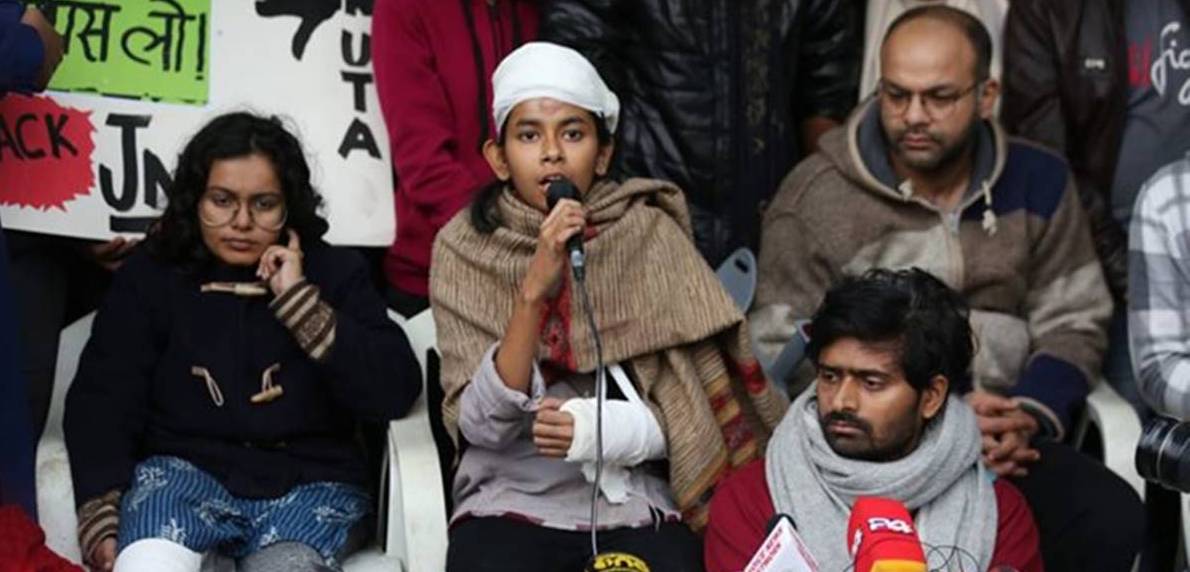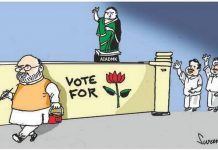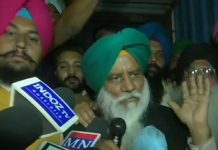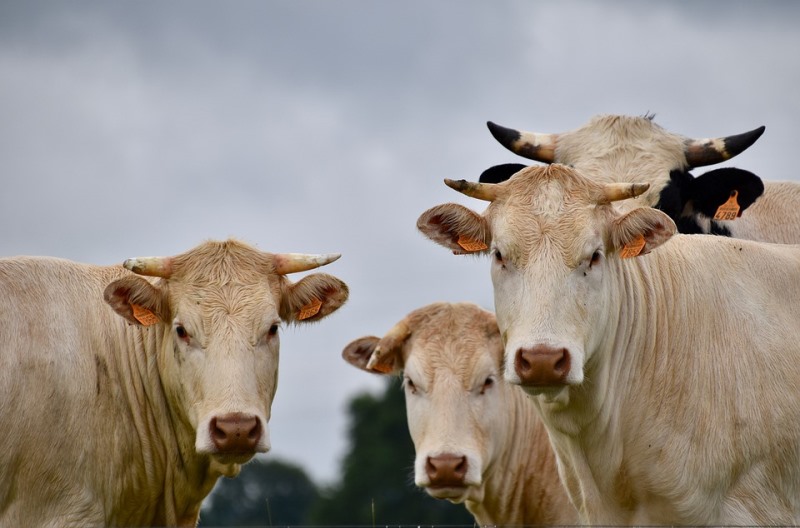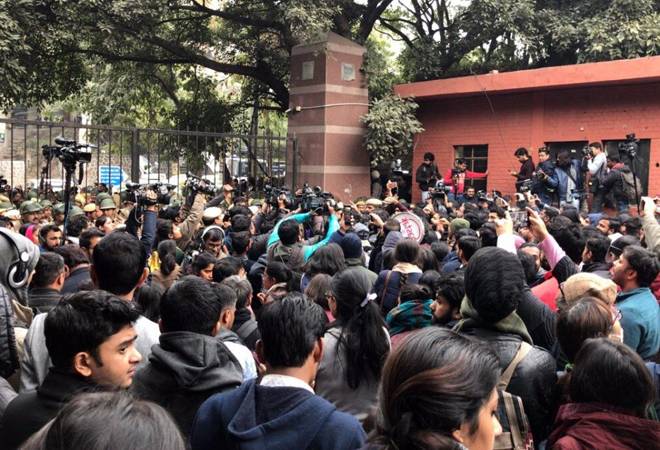As this iconic university is passing through a deep crisis, it is sad to see the ugly character of the political culture of JNU.
Not everything is fine with JNU—the country’s leading university. Yes, here is a vice-chancellor who seems determined to make students and teachers ‘patriotic’, plans to install a military tank as a symbol of nationalism, and pleads for more defence research. Here is a vice-chancellor who appears to be a stranger in a place known for its liberal education, critical social sciences and pluralism as a way of life. Moreover, here is a government that sees this place as a ‘disturbed territory’ to be kept under perpetual surveillance. But then, here is a university that has also been witnessing a systematic decay in its political culture—particularly, the way students across political formations practice politics.
Here is a university that is seeing the distortion of academic freedom that students enjoy. As the university is becoming over-crowded, we see the emergence of a crowd confusing freedom with irresponsibility; many of them do not attend classes (attendance is not compulsory; yet, the beauty of this place was spontaneous/voluntary attendance because of the vibrancy of the classroom culture), learn the language of smart slogans, theorize the psychology of ‘victimhood’ (If I do not get good grade because of my callousness, I can always allege that I am a victim—a victim of a conspiracy launched by elitist/patriarchal/Brahminical professors; and this textbook language of ‘political correctness’ works in JNU).
Here is a university slowly losing its beautiful natural landscape and eco system because of massive construction—new hostels, new quarters, new departments. Even radical students take it as normal; it is not a hot political theme. The health centre is in a pathetic state; public transportation is bad; but then, these are the issues in which you cannot bring caste/class/gender angle, and hence students do not bother about it. Moreover, students because of their partisan politics delegitimize the sanctity of the JNUSU. Anybody at any time can sit on a hunger strike, block the main gate, and call a strike.
Even when you welcome and help the freshers, you do it not as part of the JNU Collective; you are eager to show your political badge, your ABVP/NSUI/SFI/BAPSA/AISA identity. As competitive radicalism becomes the order of the day, a sustained/joint forum becomes an impossibility. In other words, JNU is in deep crisis accentuated by bad administration and fragmented politics. And under these circumstances, we will see yet another round of JNUSU elections.
Of course, JNU is known for its alternative political culture. Until now muscle/money power has not affected the campus; the culture of debate is not dead; and one can still find brilliant pamphlets, posters and visual narratives. Yet, the decay is noticeable. First, caste and religion have become major determining factors in the political culture. Yes, it is known that the cultural politics of the ruling BJP is centered on the stimulation of ‘Hindu identity’ and its newly constructed symbols often equated with the language of nationalism. As the ABVP is gaining popularity and entering the campus with its over enthusiastic followers, one notices the mobilization based on religion, its symbolism. Likewise, the BAPSA—an organization that sees Phule and Ambedkar as its philosophic icons—has begun to get the smell of power. As it emerges as a powerful force giving a challenge to the SFI-AISA alliance, its language of mobilization and campaigning gets heavily centered on one’s caste identity.
The philosophy is that only for the privileged castes, caste hierarchy is invisible; and the subaltern/Dalit/ marginalized castes cannot afford this luxury; they must speak of caste, bring the issue of caste hierarchy in everyday life, and mobilize themselves. However, there is a fallacy in this argument, despite its subaltern appeal. It seeks to fight caste through the language of caste; it seeks to fight exclusion through yet another practice of exclusion; it limits human possibilities; and it too promotes some sort of ‘conspiracy theory’—those who have a different way of looking at the caste question are invariably the age old oppressors practicing patriarchal Brahminism. And even Gandhi and Marx cannot be spared. And then, there are the leftists—utterly non-imaginative, never tired of rhetoric, utterly schizophrenic— sometimes appropriating Ambedkar, sometimes even Gandhi and Tagore. Moreover, they too would play the identity card—yes, in a subtle way that looks progressive. Imagine all the three identities of victimhood are with you—you are a Muslim, you are from Kashmir, and you are a woman; but you speak good English and the media construct you.
The radical left feels happy with this construction and media hype without realizing that even dissent can be packaged, commodified and sold. So despite your attendance at the India Today conclave of celebrities, there is no relief for a humiliated Kashmiri, a stigmatized Muslim or a woman; even your radicalism becomes your bio- data. This is the irony of the ‘progressive’ politics of JNU.
Second, gender as a politically correct identity marker has to be followed religiously. No wonder, the presidential candidates from all these political formations are women. Is it a feminist awakening? Or is it a piece of crude/strategic/identity politics—the way both the Congress and BJP chose Dalit faces as their presidential candidates. Third, the quality of the presidential debate—a noble practice, a role model—has been deteriorating every year. Hardly any constructive substance; instead, everyone attacks others, and argues how bad they are. And then, there is unmanageable noise, sloganeering; nothing can be heard. It is no less different from Arnab Goswami’s talk show—tragic as well as comic. It is sad. It is difficult to build a tradition. And it is so easy to destroy it.
So what will happen? One does not know. However, one thing is certain. JNU needs a paradigm shift. The present government with its utterly utilitarian notion of education and insecure (and hence militant) nationalism seems determined to destroy this place. And an insensitive vice-chancellor will only follow the order! And if there is no light from students, the future is bound to be bleak. Yes, students must fight the elections and write their slogans. But they have to look at themselves. Is it the politics— which is becoming a carbon copy of the much-condemned mainstream politics— with which they would fight the system and create a new JNU? Or is it that with this politics they too would fall into the same trap?
It is also true that even JNU teachers have not always played the role of true teachers as philosopher guides. They too have played the similar politics, pampered these students. It is sad to see the categories like ‘Dalit teachers’, ‘Ambedkarite teachers’, ‘Teachers as CPM card holders’, ‘Feminist teachers of ‘art and aesthetics’ variety’ and ‘Rightist teachers in close proximity with the vice-chancellor’. Amidst these categories, where is a teacher who listens, heals, understands, and goes deeper— beyond our overused/safe vocabulary of ‘caste’, ‘gender’ and ‘religion’?
This article has been written by The New Leam Staff.
The New Leam has no external source of funding. For retaining its uniqueness, its high quality, its distinctive philosophy we wish to reduce the degree of dependence on corporate funding. We believe that if individuals like you come forward and SUPPORT THIS ENDEAVOR can make the magazine self-reliant in a very innovative way.



